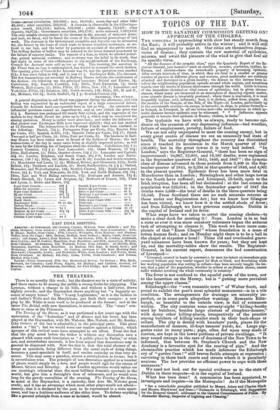THE THEATRES.
There is no novelty this week; but the theatres are in a state of activity, and there seems to be among the public a strong desire for playgoing. The Lyceum, without a change in its bills, and without a half-price, draws nightly crowds; and the Haymarket shows anything but "a beggarly ac- count of empty boxes." The "Young Legitimates," as it is the fashion to The Taming of the Shrew, as it was performed a few years ago with the restoration of the "Induction" and of Bianca and her lover, has been played at the Haymarket, with Mr. Webster, Mrs. Nisbett, and Mr. Keeley, (the Grumio of the last is admirable) in the principal parts. This piece makes a "hit"; but we would warn our readers against a fallacy, which Apropos of this revival some have attempted to set afloat. From the fact that the play acted before the tinker is without any decoration save a placard with some such inscription as "A public place in Padua," or what not., and nevertheless succeeds, it has been argued that decorations may in general be dispensed with. Now the fact is, that this total absence of at- tempt at spectacle, being different from the usual style of doing things, becomes a quasi-spectacle in itself, and excites curiosity on that very ac- count. This may seem a paradox, almost a contradiction in terms; but it Is nevertheless true. The principle of non-decoration applied to a number of pieces would simply be a bore, and people would sigh for the return of Messrs. Grieve and Beverley. A raw London apprentice would rather see one morning's rehearsal than the most brilliant dramatic spectacle in the world; but give him a fortnight's dose of rehearsals, and he would soon long for the gawdy unrealities of the evening. The Taming of the Shrew, as acted at the Haymarket, is a curiosity, that does Mr. Webster great credit; and it has an advantage which most other plays would not afford— namely, that it is declared by the poet to be represented in a state apart- ment, and has a fictitious audience of the olden time. To deduce anything like a general principle from a case so isolated, would be absurd.


























 Previous page
Previous page